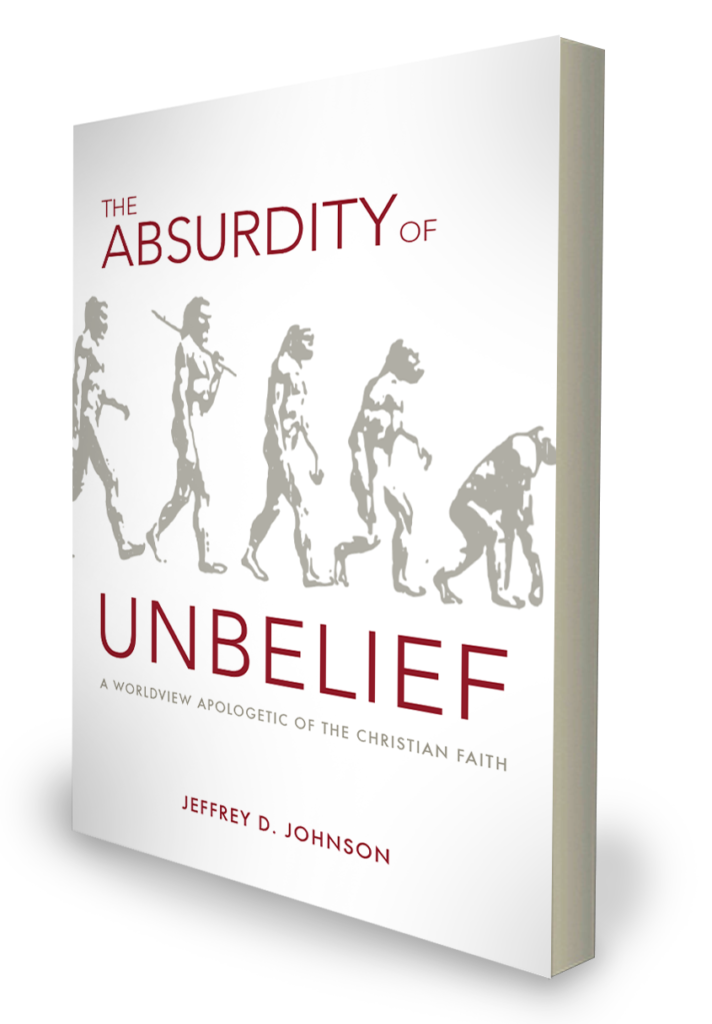
Free Grace Friday is a weekly post sharing updates and book excerpts from Free Grace Press. Each Friday we will be posting news about FGP books, featuring excerpts, and most exciting for you, telling you how you can get access to great sales on biblically solid, Christ honoring resources from FGP.
Our featured book this week is The Absurdity of Unbelief: A Worldview Apologetic of the Christian Faith by Jeff Johnson. The special sale price this week is $9 (normally $18)!
Also, you can enter to win a copy of The Absurdity of Unbelief at the end of this post. Two giveaway winners will be selected Saturday at 12pm CDT.
The Absurdity of Unbelief

One cannot deny logical and ethical absolutes without the use of the laws of logic and ethics in the process. If some say they don’t care about logic, then they might as well say that they are okay with sounding absurd. Why would anyone want to take them seriously? If some do not care about being ethical, then why would anyone want to trust them when they admit that lying is okay?
Without God, there is no meaning, no truth, no rationality, and no ethical standard. Because without God—and specifically the God of the Bible—there is no foundation for logic or ethics to be utilized in argumentation at all (as we shall see).
In other words, I don’t believe in intellectual atheists any more than I believe in relativists who take relativism seriously. Sure, there are plenty who call themselves atheists, but deep down, they are lying to themselves. Sure, there are plenty who hold to relativistic thinking, but this does not mean that they truly think it is okay for others to cheat, defraud, exploit, or kill them. No matter how postmodern and open-minded many may think they are, they cannot help but get incensed when others take advantage of them. So, no, I don’t believe in atheists or relativists.
Knowing this is a bold way to introduce a book on Christian apologetics, I would only challenge you to try to remain honest with yourself as you read this book. If you happen to be a self-proclaimed atheist, agnostic, or skeptic, see if you can be honest with your conscience and continue to deny the existence of God.
I hope that all skeptics of Christianity read this book, not because I feel I have written the best book on the subject, but because I am persuaded by the coherency of the Christian worldview that Christianity is true. It is the onlyworldview that is intellectually and practically defensible, for it is the only worldview that can give a coherent answer to why there are logical and ethical absolutes.
I write with certainty, but that does not mean this book is certain to bring any unbeliever away from his or her unbelief. Even though I am convinced that Christianity is both right and defensible, I am not convinced that this is enough to convince unbelieving skeptics. I couldn’t agree more with J. I. Packer who said:
“It is not for us to imagine that we can prove the truth of Christianity by our own arguments; nobody can prove the truth of Christianity except the Holy Spirit, by his own almighty work of renewing the blinded heart. It is the sovereign prerogative of Christ’s Spirit to convince men’s consciences of the truth of Christ’s gospel; and Christ’s human witnesses must learn to ground their hopes of success not on clever presentation of the truth by man, but on powerful demonstration of the truth by the Spirit.[1]”
The problem with unbelief, as I explain in PART 2, is not a lack of evidence or rational warrant; unbelief is due to a lack of appreciation for the truth. Faith in Christ requires more than just intellectual knowledge of Christ; it requires a love for Christ that comes only by the illumination of the Spirit (as we shall see in chapter 26). This is something that goes beyond the reach of apologetics, for only God can reveal Himself to us in such a way for us to be willing to sell all that we have and follow Him.
Though I cannot be certain this book will be of any eternal value for unbelievers, I can write with the knowledge that apologetics is a great value to those who already love the Lord Jesus. In some ways, apologetics is more helpful for believers than for non-believers. This may sound odd, since believers already have faith in Christ, but just as the gospel is continuously beneficial for believers, Christian apologetics is helpful in strengthening and encouraging the faith of those who already believe – especially if we have a biblical apologetic, “for faith comes by hearing, and hearing by the Word of God” (Rom. 10:17).
My aim, though, is not to instruct the reader on how to carry out apologetics, or to discuss the differences between the various apologetical approaches, but to carry out an apologetic. I am not simply seeking to defend the Christian worldview from outside criticism, but to provide an offensive attack on all forms of unbelief.
Because the Christian worldview is the only system of thought that is cohesively consistent with itself, all other possible worldviews are inherently incoherent. It is not sufficient for an atheist or any other skeptic to simply attack the walls of the Christian worldview. They must also defend their own ground. They must protect their own presuppositions and belief systems.
My aim is to show that the castle of unbelief rests on quicksand, and the more unbelievers struggle to defend their worldview, the more they sink under the weight of it. Atheism, deism, naturalism, relativism, existentialism, pantheism, polytheism, and any other non-Christianism, along with Judaism and Islam, are incoherent and, thus, rationally indefensible. So let us prepare to defend our own castles and see which worldview ultimately ends victorious.
(Taken from the Preface of The Absurdity of Unbelief)
[1] J. I. Packer, Knowing God(Downers Grove, IL: IVP, 1993), 71.
Free Grace Press is firmly committed to the gospel of Jesus Christ and the Biblical truths of His Word (the inspiration of Scripture, the Trinity, the deity of Christ, the doctrines of grace, and the importance of the local church) as expressed by the historical reformed confessions, such as the 1689 London Baptist Confession. To this end, Free Grace Press seeks to publish a wide assortment of Christian literature from both historical and contemporary authors who uphold these core commitments; propagating books and tracts that we believe will be spiritually inspirational, doctrinally educational, and practically helpful for the universal church of God.
Enter to win a copy of The Absurdity of Unbelief below!
The corporation shall not discriminate against applicants, employees, students, volunteers, and others on the basis of race, color, nationality, or ethnic origin; however, as a religious institution, the corporation reserves the right to deny or terminate employment or to deny or terminate any other status of persons whose lifestyle, words, actions or otherwise do not align with the corporation’s Statement of Faith, standard of conduct, or other policies of this organization.

